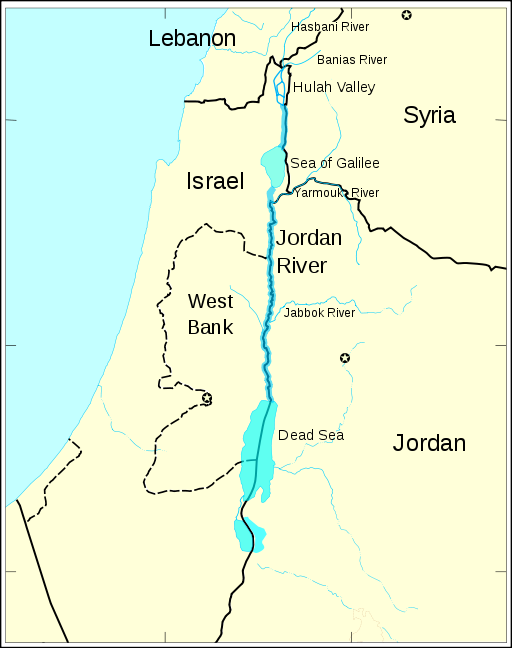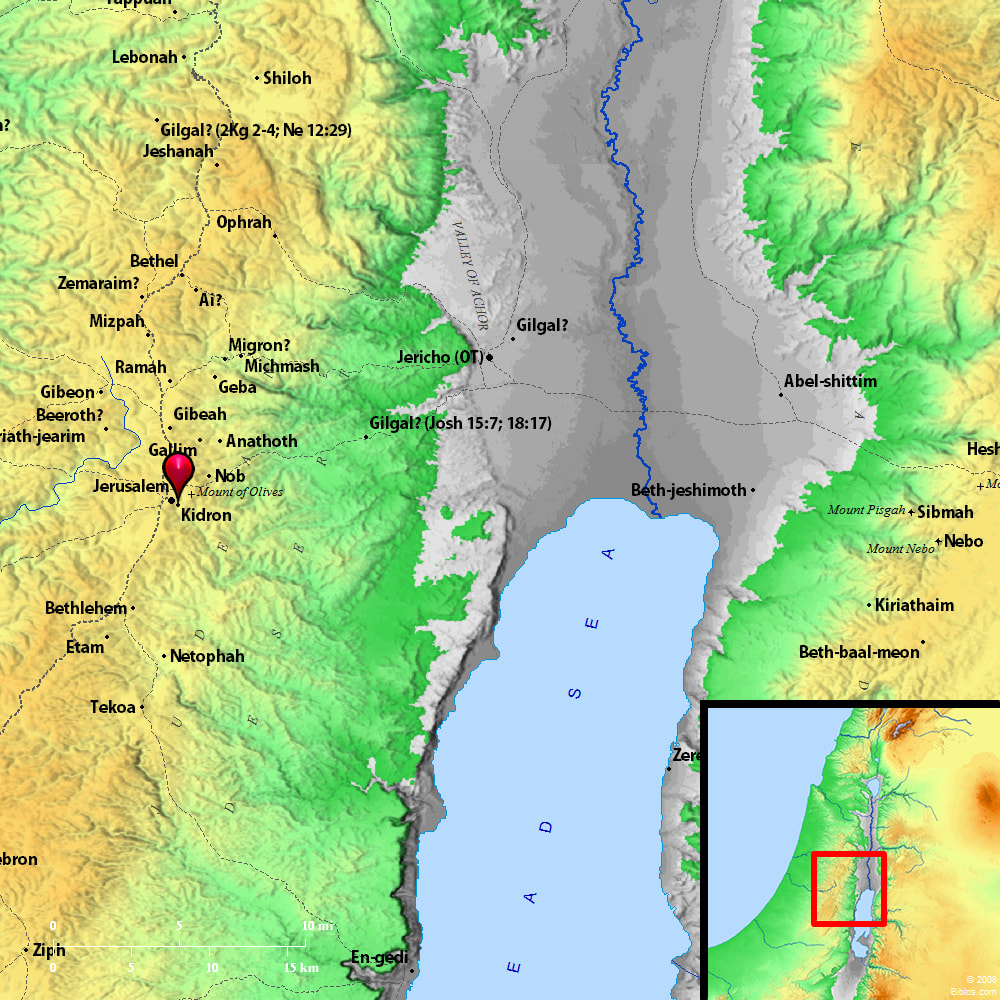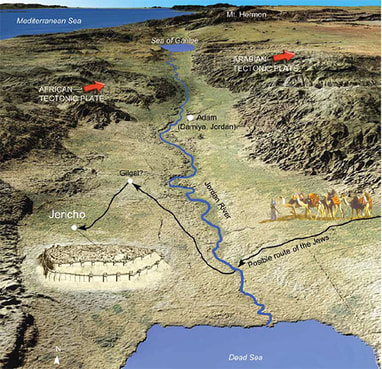The First Fruits Offering and The Wave Sheaf
By NeorahYah Germaine Yisra'el
The Spring Harvest
In ancient Yisra'el, various legumes, grains, and herbs were harvested in the spring. The most important of these crops were barley and wheat.
Wheat cultivation requires a high percentage of rainfall, and mineral rich soil.
In the Pleistocene/Glacier era, the Dead Sea enlarged its banks and overtook the entire Yarden Valley, leaving the soil, once it receded, rich with minerals and nutrients. This became the perfect medium in which wheat could thrive.
Both barley and wheat were planted in autumn, and ripened in the spring of the following year , however, barley matured faster than wheat, and was harvested sooner.
The city of Yericho was located in a valley, or plains (known today as the Jordan Valley), near the western banks of the Yarden River, within a days' walk of Mt. Jabal al-Quarantal (where Rachav sent the spies).
Gilgal, the place where Yisra'el encamped after crossing the Yarden, was located on the eastern border of Yericho.
~The Book of Joshua~
Since it was the first harvest of the spring, barley is the grain associated with the Feast of Unleavened Bread, the Wave Sheaf, and the First Fruits Offerings. It was tied in sheaves and brought to the High Priest to be 'waved' before Yahuah as the First Fruit of the Spring harvest. The commandment was that this be done before any of the barley harvest was eaten. It is an ordinance throughout our generations.
'And Yahuah spoke unto Mosheh, saying, Speak unto the children of Yisra'el, and say unto them, When you
are come into the land which I give unto you, and shall reap the harvest thereof, then shall you bring
a sheaf of the firstfruits of your harvest unto the priest: And he shall wave the sheaf before Yahuah,
to be accepted for you: on the morrow after the Shabbat the priest shall wave it...
And you shall eat neither bread, nor parched grain, nor green ears, until the selfsame day that you have
brought an offering unto your Mighty One: it shall be a statute forever throughout your generations in all your dwellings.' ~ Leviticus 23:9-11 and 14~
The Wave Sheaf Offering is forever connected to the Feast Of Shavuot, aka, The Feast of Weeks, aka, the Feast of Pentecost, or simply Pentecost in the Christian religion.
The Wave Sheaf and Shavuot are the only two Appointed Times that are not given specific dates, e.g. the Pesach, or Yom Teruah, when Yahuah specifically says; 'on the 15th day of this month', or, 'on the 1st day of that month', in the Scriptures. That is not to say that the two dates are flexible, or don't have a day on which they are to be observed; rather, the date of the Feast of Shavuot is dependent upon the date of the original Wave Sheaf Offering. You cannot keep the Feast of Shavuot, if you do not know when, and in association with what, the first Wave Sheaf was offered in Gilgal.
Our ability to read and comprehend scripture, determines our compliance with Yahuah's Commandments; and as always, His Time Clock, not the Gregorian's, is what rules over all.
How did the Yisraelites know when to bring the Wave Sheaf Offering?
In the above scripture, Yahuah gave three very clear instructions:
1. 'When you are come into the land...and shall reap the harvest thereof...'
2. '...then you shall bring a sheaf...'
3. '...on the morrow after the Shabbat.'
Let's examine each criteria closely.
When did Yisra'el come into the Promised Land?
Yisra'el wandered in the desert for 40 Years. Aharon died on Mount Hor in the 40th year after the Exodus, in the 5th Month, in the 1st day of the month.
~Yasher 84:31~
Mosheh died on Mount Avariym in the 40th year after the Exodus, in the 11th Month... and the children of Yisra'el wept for him 30 days. ~Deuteronomy 32:49, and 34:1, 5, & 8~
That brings us up to the 12th Month, in the 40th year after the Exodus.
Yahushua, ben Nun is anointed in Mosheh's place. He sends spies across the Yarden to search out the land. They are gone for a total of 4 days. Meanwhile the Yisraelites leave Shittiym in 1 day, move to the shores of the Eastern Bank of the Yarden, and make camp for 3 days. ~Joshua, Chapters 1-4~
The next date mentioned is in ~Joshua 4:19~
'And the people came up out of the Yarden on the 10th day of the first month, and
encamped in Gilgal.'
Yisra'el came into the Promised Land on the 10th Day of the Monthly Count of Abib. They were Set-Apart while the men healed from circumcision until the 14th Day of Abib, when they kept the Pesach; the same as their ancestors had done 40 years earlier. This date is significant because it is also the date Appointed by Yahuah for choosing the sacrificial lambs. In four days, the people would keep the first Pesach observed in the Promised Land; but before it could be done, all of the males had to be circumcised: ~Exodus 12: 43-50~ This was accomplished on the same day they entered the land. ~Joshua 5:2-9~
There is some debate as to how the men could have healed to eat of the Pesach, in only 4 days?
The answer is simple: With Yahuah all things are possible, for they were healed, and recovered in time for them to keep the Pesach on Abib 14th. Below is the scriptural evidence:
'And the children of Yisra'el encamped in Gilgal, and kept the Pesach
on the fourteenth day of the month at evening in the plains of Yeriycho
'And they did eat of the old grain of the land on the morrow after the Pesach,
matstsah cakes, and parched grain in the selfsame day.' ~Joshua 5:10-11~
This is Strong's Concordance definition of:
1. Corn (H1715): grain:-corn, wheat, cornflour. (H7641): ears, ears of 'corn'/grain.'
2. Parched (H7033): to burn, to be roasted, dried. (H7039): roasted grain, parched grain.
3. Green (H3892): fresh, fresh-cut, still moist. (H3759): new grain, newly ripe grain, plentiful field.
4. Old (H5669): produce, yield, corn
Note: In ancient biblical times, 'corn' was a generic term used to to describe all grains indigenous to Yisra'el, mainly barley, wheat, rye, spelt, lentils, etc. Yellow corn as we know it in the western hemisphere was not found
at that time.
Abib (H24): head of grain, already ripe but still soft, green ears of 'corn,' in the ear.
Also, in Yisra'el 'old grain' is the crop that was planted the previous autumn and matures over the winter. Old grain is the 'Spring Harvest;'or what is known as the First Harvest.
When did the children of Yisra'el reap a harvest?
The children of Yisra'el began harvesting the land in the Valley of Yericho almost as soon as they'd crossed over the Yarden. Remember the command of Yahuah to Mosheh forty years earlier in Leviticus 23:10:
'...When you are come into the land which I give you, and shall reap the harvest thereof...'
They must've been extremely joyous to see miles of barley fields just waiting to be harvested, and I'm sure they
wasted no time reaping the benefits. This was the time that the Wave Sheaf was gathered. The first of the
harvested barley was bundled into a sheaf, and set aside to be brought before the priests, and waved before Yahuah
after the Shabbat. The Wave Sheaf Offering also consists of the First Fruits Offering. First Fruits is exactly what it implies. It must be the first from the harvest of a crop. The best of the crop. However, they did not eat of this crop for the Pesach, as they were forbidden to do so:
'And you shall eat neither bread, nor parched grain, nor green ears, until the selfsame day that you have
brought an offering unto your Mighty One: it shall be a statute forever throughout your generations in all your dwellings.' ~Leviticus 23:14~
'Selfsame': exactly the same, same. (Merriam-Webster).
Here Yahuah is referring to the parched/roasted grain and the abib/green grain of the Spring Harvests left behind when He drove out the Canaanites. This is the grain that will be waved before Yahuah.
At what point did they bring the Wave Sheaf Offering to the priests?
The day after the Pesach is a Shabbat; which coincided with the Feast Of Unleavened Bread, lasted throughout the day, and ended at evening. ~ Genesis 12:16~
The Pesach began on Abib 14 in the evening, with Death in the land beginning at midnight. The 'Set-Apart' hours of the Shabbat began at sunrise on Abib 15, until the evening. The Wave Sheaf Offering was on Abib 15, in the Evening Watch and coincided with the evening sacrifices already being offered to Yahuah. The Wave Offering was a part of the Peace Offering and the Burnt Offering, which burned continually before Yahuah. Nothing but the best of the harvest, the best of the herd, the best of the flocks; the 'First-Fruits' of all was ever 'waved' before Yah.
The Feast of Unleavened Bread began on the 15th Day. During the Exodus, the Yisraelites had already begun eating their unleavened bread during the Pesach. 40 years later, as they were about to enter the Promised Land, the only stipulation that Yahuah stressed was that they could not eat of the old grain he was providing in the land of the Canaanites, until they had offered the Wave Sheaf.
The Feast of Unleavened Bread lasted for 7 days, until the evening of Abib 21, when preparation for the upcoming Shabbat also began. The 'Set-Apart hours' of the Shabbat being sunrise to sunset on Abib 22 .
8 - 15- 22 - 29!
'And he shall wave the sheaf before Yahuah to be accepted for you: on the morrow after the Shabbat
the priest shall wave it. ~Leviticus 23:11~
This is Strong's definition of:
Morrow(H4279, H4282, H4283): tomorrow, the next day, the day after.
Now here is where Yahuah's Time Clock shines the light.
After Yisra'el came into the Promised Land, the evening of the Pesach began a Preparation for a Shabbat. Same as it did 40 years earlier at the Exodus from Egypt; same as it did at Yahushua, HaMashiach's crucifixion; same as it will this year, or next year.
There are some who have asked:
'What were the Yisraelites eating on the Pesach if they couldn't perform the Wave Offering until the
evening the following day?'
Remember, the Yisraelites hadn't just come from Egypt. They were 40 years into their Exodus.
They were using grain they'd planted, harvested, and stored when they were on the Eastern side of the Yarden; before they'd come into the land. The most likely location being Kadesh Barnea, where some biblical scholars believe the Yisraelites were encamped for 38 years, instead of wandering around the desert, as most of us have been taught. If that is so, that certainly would've been enough time to grow multiple crops!
Note: Their sojourns in the wilderness are chronicled in the book of Numbers. I plan on spending some time researching the topic, Yah Willing.
Anything creditable I find to support the position I will add, correct, or amend here.
Yahuah's command was specific:
- 'When you are come into the land...
- and shall reap the harvest thereof, then shall you bring...'
- on the morrow after the Shabbat...
Direct and to the point. They would've eaten from what they brought with them across the Yarden for the Pesach; but they could not eat from the abib/green/new barley freshly reaped in the Promised land, or from any parched (old) grain found in the new land when the Canaanites were driven out, until the Shabbat was past and the wave sheaf offered .
Yahuah was fulfilling His part of the Covenant. He'd brought Yisra'el through forty years of being in the wilderness. During that time He'd slowly driven all of the heathens out of the land of Canaan before them. He did that so that the land would not become populated by wild beasts that would've threatened His people. Now He was about to bring them across the Yarden, into a land already planted with crops, and waiting to be harvested. All He asked is that they acknowledge His beneficence by offering the first fruits of what He'd provided, up to Him.
Another debate is that Yahuah did not require the Wave Sheaf until the second year, after the Yisraelites had been in the land and had planted and harvested a crop.
This makes no sense. As stated above Yah provided for them free of charge, in fulfillment of His promise to Abraham:
'For He remembered His Set-Apart promise, and Abraham His servant.
And He brought forth His people with joy, and His chosen with gladness:
And gave them the lands of the heathen: and they inherited the labour
of the people; That they might keep His statutes, and guard His Torah.
HalleluYah. ~Psalms 105:42-45~
Enough said.
The Feast Days were paramount in the fulfillment of the Covenant with Abraham:
- Yahuah confirmed His promises to Abraham under a dark moonless sky - which only occurs on the 14th and 15th Days of the Monthly Count.
- Yahuah brought His people out of the bondage of Egypt, on Abib 15 after the Pesach.
- With a mighty hand He led them through the Sea of Reeds on the 4th Day of the Feast of Unleavened Bread.
- They went three days into the wilderness of Shur, to encamp at Marah on the 7th Day of the Feast; which was the 21st Day of the Monthly Count of Abib. They rested the next day, which was a Shabbat, on the 22nd Day of the Monthly Count.
- 40 years later, Yahuah gave Yisra'el possession of the Promised Land, with all of the bountiful harvests of Canaan, on Abib 15.
- That day was also a Set-Apart Day; a Holy Assembly/Shabbat unto Yahuah. ~Exodus 12:16~ Yisra'el would've eaten their bread for the first day of the feast from the grain they brought with them over the Yarden River. For the remaining feast days, they would have begun to harvest and utilize the abandoned grain Yahuah provided for them in Canaan; but only after it had been offered as a Wave offering when the Shabbat ended earlier in the evening, as commanded.
- The walls of Yericho fell, and Yisra'el took possession of the city on Abib 21, the last day of the Feast of Unleavened Bread. What a commemoration of their first feast in the Promised land!
The beauty of the Wave Sheaf offering is that it foreshadowed Yahushua's First Coming.
Having died, and resurrected on the 3rd Day, He is also the First Fruits of the Righteous Dead who will be resurrected at His Second Coming.
The original Wave Sheaf was cut from a harvest the Yisraelites had not laboured on. The entire harvest, the soil from which it grew, the water that nourished it, all of it was a gift from Yahuah. It was freely given to Yisra'el in fulfillment of Yahuah's promise to Abraham.
So too, Yahuah also freely gives us His Son, Yahushua, HaMaschiach, the true Wave Sheaf. Yahushua was the willing sacrifice offered up to Yahuah for our acceptance and salvation; and like the analogy of the leavening, there was no sin found in him. There is no amount of work on our part, worthy of this gift; except to acknowledge the love behind such a gift, and live our lives as Yahushua lived his.
Remember, in order to know the correct month, and day of Shavu'ot, you must first calculate the correct day and timing of the Wave Sheaf Offering. Only then can you begin to count the omer.
For more on this subject, see: Shavu'ot, The Hidden Truth
Yahuah Yireh,
~NeorahYah Germaine Yisra'el~


